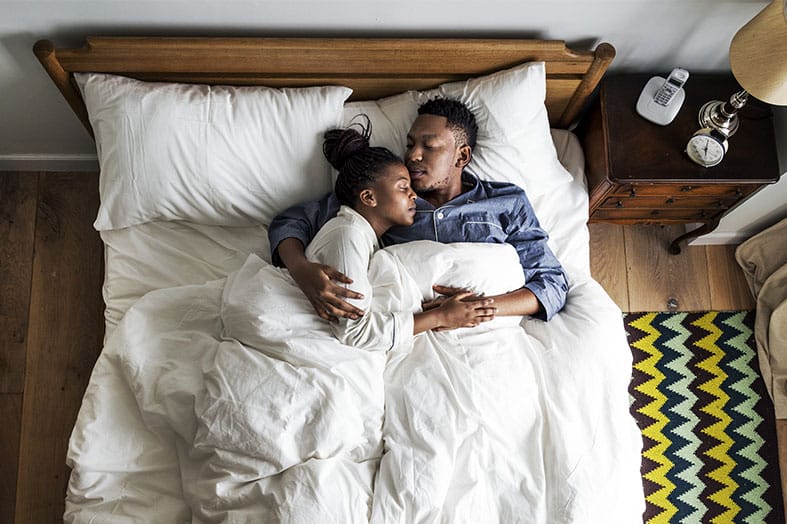Your Valentine May Bring You Better Sleep
Your Valentine May Bring You Better Sleep

THURSDAY, Feb. 14, 2019 (HealthDay News) — Sure, he may snore. She may steal the covers. But if a relationship is solid, your partner will help you sleep better this Valentine’s Day and far into the future, a new study suggests.
Good relationships in early adulthood seemed to lead to less disruptive life events, which in turn appeared to lead to better sleep years later, researchers report.
“Your partners can have a huge impact on your stress and health behaviors. They can be a source of stress or a reducer of stress,” explained study author Chloe Huelsnitz. She’s a Ph.D. candidate in the department of psychology at the University of Minnesota in Minneapolis.
So, how does being in a satisfying partnership affect sleep? Are people more content, or is a good relationship just a sign that you have better people skills that help reduce your stress throughout life?
“It’s probably a bit of both,” Huelsnitz said, though the study could not prove that a good relationship caused sleep quality to improve.
She explained that if you can have a good relationship, you probably have good interpersonal skills. And if you get along well with your partner, you’re probably less likely to get into a fight with your boss or a friend.
“Also, if you have someone to support you during stressful life events, it helps to buffer that stress,” Huelsnitz added.
The study authors noted that past research showed a link between a greater response to stress and worse sleep. Past research has also shown that the quality of a romantic relationship helps predict how well you sleep. But what hadn’t been studied was the ongoing patterns between a good relationship, stress and sleep.
To see if they could answer this question, the investigators reviewed data from a long-term study that began in the 1970s. More than 250 women were recruited during the last trimester of their pregnancy. The children were followed until they were adults, and then some of them agreed to participate in the ongoing research.
For this study, the researchers had complete information on 112 people from their early 20s until they were 37. The volunteers were interviewed about their relationships when they were 23 and 32 years old. They were also asked about stressful life events at 23, 32 and 37 years.
When they were 37, the volunteers provided information on the quality of their sleep, as well as how long they typically slept.
“People who reported better relationship experiences at 23 had fewer stressful life events at 32 and slept better when they were 37,” Huelsnitz said. However, good relationships didn’t seem to impact how long people slept.
Dr. Alice Doe, a sleep medicine physician at Ascension Borgess Hospital in Kalamazoo, Mich., said there are a number of reasons why a good relationship could lead to better sleep.
“Somebody that is able to have great personal relationships has to have other coping skills, like to ability to soothe and build trust,” said Doe, who wasn’t involved in the study. “And sleep is better when we’re relaxed, and when we have a personal life that is stable, it helps us feel more reassured that everything is OK.”
Plus, she added, when people are in a happy romantic relationship and in love, the body secretes substances in the brain (neurotransmitters) that help you feel good. These neurotransmitters also promote restful sleep, Doe said.
But do the findings mean you’re doomed to endless nights of tossing and turning if your romantic life hasn’t been the best? Not necessarily, said Huelsnitz.
“My personal opinion is that it doesn’t have to be a cycle. We do know that there are ways to reduce stress in life. Early in life, you may not have figured out what it is to be a good partner, but you can fine-tune your relationships and break the pattern,” Huelsnitz said.
Doe also noted that decreasing stress at any point in life is a great way to improve sleep.
“We’re all under stress at different times, and have to develop coping skills to deal with it. Take deep breaths, write in a journal or practice yoga,” she suggested.
The findings were recently published in the journal Personal Relationships.
More information
No matter what the state of your relationship is, the U.S. National Institutes of Health has tips for getting better sleep.
SOURCES: Chloe Huelsnitz, Ph.D. candidate, department of psychology, University of Minnesota, Minneapolis; Alice Doe, M.D., sleep medicine physician, Ascension Borgess Hospital, Kalamazoo, Mich.; Feb. 5, 2019, Personal Relationships
Copyright © 2018 HealthDay. All Rights Reserved.
